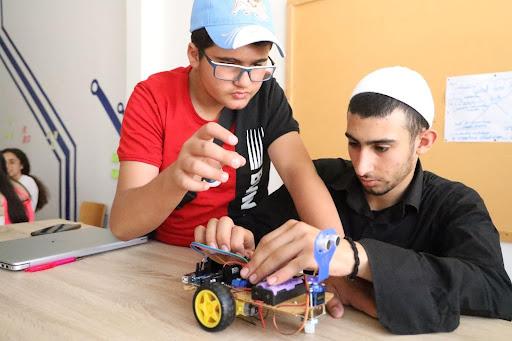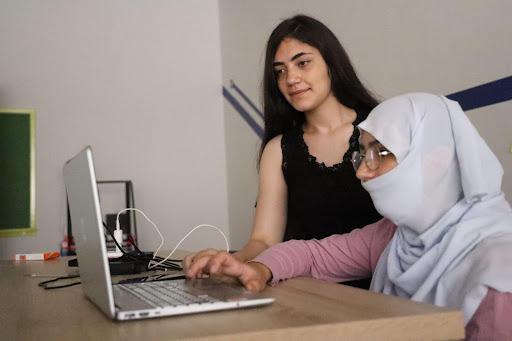A movement of Lebanese school leaders is preparing students for the future of work amidst multi-level crises

Insufficient investments in Lebanon's school system threatens to wipe out our human capital advantage in the region during what The World Bank refers to as “the most devastating, multi-pronged crisis in its modern history”.
Our National Curriculum has not been updated since 1997, and children have below average literacy and numeracy rates in the Middle East. Students are suffering a blow to the learning they need to succeed each academic year, as well as excel in their future careers. And the divide in access is only getting wider.
While this situation feels hopeless to many, we believe it is our call to push for a new education system that mirrors the educational needs of our nation's youth. To do so, we have to work collectively, get creative, and aim high to devise solutions that will transform, rather than just fix, our crippled system. This can be done by tapping into underused (and underestimated) resources: educators and their supportive school communities, who have the highest stake and drive towards reform.
With this context in mind, in 2022, we joined a group of Lebanese citizens and together founded nafda to implement solutions to the systemic problems that have plagued Lebanon’s education sector.
nafda (n): Arabic word meaning spring cleaning, a movement towards regeneration, coined by the pioneering principals of the movement
At nafda, we staunchly believe that while children are being set back, we cannot afford to keep the schools in their current state. Institutions in Lebanon need regeneration at every level, from infrastructure, tools, and opportunities, to leadership, capacity, values, and mindset. They need innovative and scalable approaches that will allow students to advance as 21st century learners, effective citizens, and young professionals prepared for the future of work.
We primarily focus on empowering schools to lead bottom-up transformations through the design, implementation, and scaling of grassroots solutions by restoring and leveraging the agency of school principals and engaging their school communities.
In 2022, 20 principals joined us and introduced education innovations into their institutions, aiming to scale their solutions to around 100 schools in 2023 and build other movement engagement activities. The principals of these pioneering schools adopted a Community Visioning Process developed by the Center for Universal Education at the Brookings Institution, to engage their communities in determining their most pertinent education priorities. After sharing these priorities with each other, the principals consolidated them into thematic areas.
Each thematic area laid the foundation for a nafda lab. Alongside peer schools in their respective lab, each team (consisting of principals, students, teachers, and parents) set a hyper-ambitious 100-day goal and found creative ways to achieve it. This is a framework pioneered by Reinstitute/ Rapid Results Institute, designed to inspire intense collaboration, rapid innovation, and disciplined execution.
In the process, the school teams were matched with local actors who could provide expert knowledge and technical support on their individual project, all in a brief, yet impactful, amount of time.

Our efforts aim to foster the essential values necessary to maintain sustained social transformation in Lebanon. These values include good governance, social justice, and effective citizenship to build a democratic, inclusive, and developed Lebanon.
One of our many success stories focuses on STEAM skills and involves students of a public school who embody what it means to develop a maker's mindset. In collaboration with the American University of Beirut’s Maker Space (now called In Space) and Codebrave, we trained 50 students in coding, web design, and 3D printing. Using this knowledge and leveraging the resources provided in their STEAM Lab, students developed and sold websites to small businesses in Mount Lebanon. The proceeds were funneled back to improve the school's digital infrastructure, and the first cohort of students documented the experience and is passing down the learnings to students in other grades.
We are also working to ensure that the activities we support schools to develop to preparing students for the future of work are inclusive and equitable. For example, have worked with a special needs school’s leadership and teachers to equip them with the digital technology and devices to support differentiated learning. And we partnered with YMCA Lebanon to foster students’ intra/interpersonal and financial literacy skills, so that as they learn about savings, spending planning, and budgeting, they're increasing their ability to be self-reliant.
What we have learned
Principals have the greatest stake in reform, and many are willing to go the distance to achieve it. They have integrity, versatile capabilities, unwithering grit, and high aspirations for raising the next generations of exemplary citizens.
Effective principal leadership can have a profound impact on both teachers and students in the learning process. With the right resources, tools and support from principals, teachers are empowered and feel motivated to work as a team to provide their students with the best possible opportunities to grow, learn, and develop.
Although the students do not have an updated curriculum to follow and to learn from, they are growing their knowledge and skills through their involvement in projects. They are learning to become agents of change in Lebanese society, and getting ready for the world of work.
We were thoroughly impressed by the level of creativity demonstrated by the students when given access to the necessary tools and resources. Their potential was unlocked, and we observed a strong drive to excel. The students exhibit a high level of ambition, demonstrating a confidence that no opportunity is beyond their grasp, even within the constraints of a challenging cultural context. Their approach to learning underwent a significant transformation as they gained practical experiences and applied what they learned to real-life situations. The act of solving community challenges further fueled their motivation and desire to learn.
Most importantly, we realized that a sense of ownership goes a long way with school leadership. Rather than telling them what to do, we support them with what they need to feel a sense of agency, agility, and empowerment in achieving their goals.
The principals, as a collective, share a common experience that has contributed to a sense of solidarity—of not being alone—among them, and has led to the emergence of shared ambitions for change. They are now in the process of recruiting like-minded principals to join the nafda movement.
What's next
In less than a year, our partner schools have already begun joint activities, exchanging learnings and visiting each other's premises. Now, they are gearing up to establish a peer-to-peer movement to support each other and new joiners in 2023. Through this work, we anticipate an increase in the agency of over 100 principals, the upskilling of 300 teachers, and the values-driven and academic development of approximately 25,000 students.
Watch this video to learn more about nafda, and visit the nafda website to support its mission.



